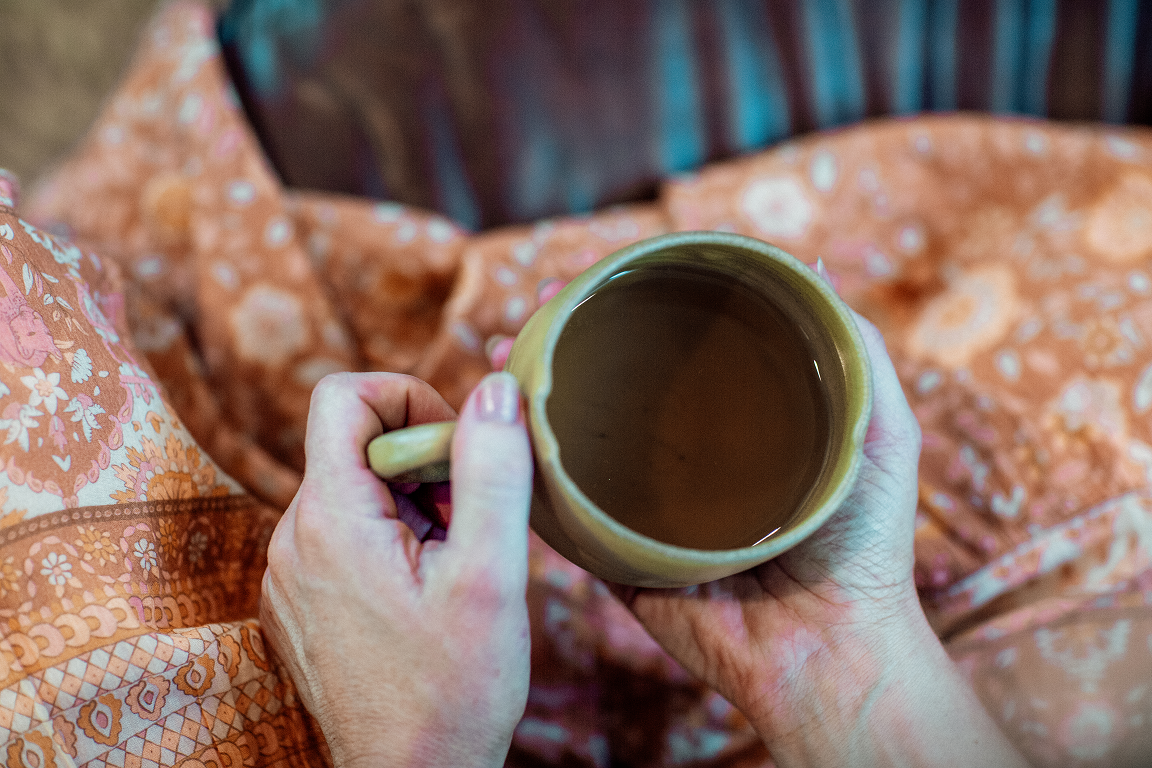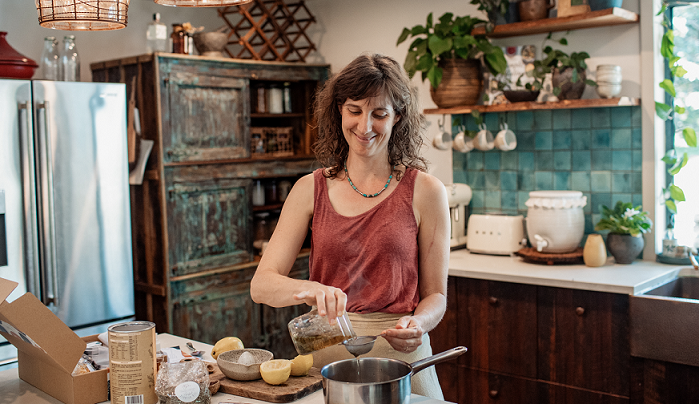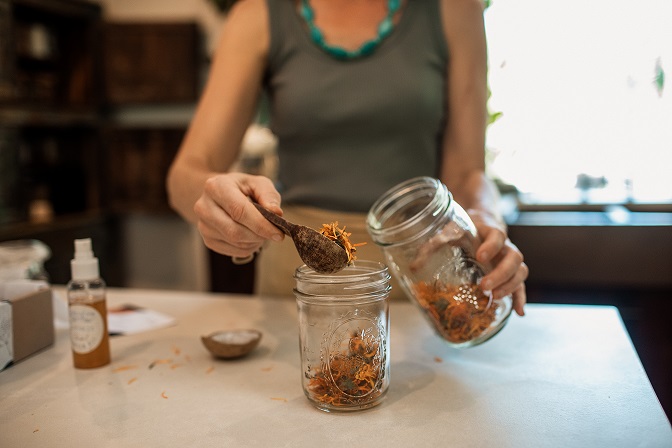If you’re making herbal medicine at home and your herbal remedies aren’t working, here’s a handy checklist to go through:
- Are the herbs good quality?
Are your herbs vibrantly coloured and smell good (or what they’re supposed to smell like, which sometimes isn’t “good” 😂). When you taste them, do they have flavour (whether that’s pungent, sour, bitter etc)? Are there signs of spoiling?
If you’re storing herbs at home, I recommend keeping them in an airtight glass container and keep in mind, dry herbs are usually only really fresh for a year (or as short as 6 months and up to 2 years). They’re best kept in a dark cupboard that’s relatively temperature stable (but do your best and use your common sense, you also want them accessible to use, not locked up in a dungeon).
It sucks to have to throw herbs out (and by that I mean compost them), but if your herbs aren’t good quality, neither are your remedies and they won’t work as effectively.
2. Are you using the right dosage?
Higher doses aren’t necessarily better, but if your herbal remedies aren’t working, this might be a factor. With tinctures, it can be relatively straightforward to increase the dose by a few drops, to mls until you reach the higher suggested dosage range. But there are two other elements to consider:
The first is using enough herb material. Oftentimes you’re just not getting enough herb to make effective remedies, and this can be with a variety of preparations, such as teas, infused oils, vinegars or tinctures.
The second thing to think about is steep time. Chamomile can make a delightful beverage tea with a 5 minute steep, but if you really want its strong antispasmodic effects to help with period pain, you might need a 20 minute steep with up to ¼ cup of herb material.
Always check with a trusted herbal reference to see the safe, suggested dosage range for each herb. Keep in mind, some herbs are only to be used in low doses (although you’ll generally know that because these will often be given from a practitioner).

3. Are you taking the herbs regularly enough?
Often (*not always*- really depends what you’re using them for) small doses of herbs taken regularly is more effective that large doses less often. For example, at the very first sign of a cold (ie within first 24 hours), I use elderberry syrup every hour before tapering off to 3-4 times day (learn more about how to use elderberry syrup effectively)
Most remedies don’t need to be taken hourly, but this is really the art of home herbalism, and you’ll find your rhythm over time.
Sometimes it’s not about regularly through the day, but regularly over time. For example, many adaptogenic and immunomodulating herbs, such as astragalus or withania, have cumulative effects, meaning you need to take them regularly over time for them to be effective.
4. Is this the right preparation for this herb?
We have a wide variety of ways to work with herbs – in water, alcohol, vinegar, glycerine, honey, whole powdered herbs, in oil etc. Whilst some of these are just personal preference and what’s available, often it’s because certain chemical constituents extract better in different preparations.
If your herbal remedies aren’t working, then it’s really important to consider if you’re making the right preparation.
Even when working with the same herb, you might work with it in different ways to extract different constituents. For example – you might have heard nettle is an amazing source of iron, calcium, magnesium, potassium, and zinc, but these minerals don’t extract well into alcohol. So if you’re using a nettle tincture you won’t get these benefits (but you’ll still get the anti-histamine actions for example). If you want the nourishing components, these extract better into vinegar or water.
So then you decide to make a nettle tea. Going back to the second point however, quantity of herb and steep time are both really important here.
Steeping a teaspoon of nettle for 5 minutes won’t give you the nutrient-dense punch you’re looking for, compared with a traditional nourishing infusion, which uses 30g of herb (per litre) with an 8 – 12 hour steep time.

5. Is this the right herb for this condition or person?
We are all different and herbs are all different. Respecting this, it doesn’t make sense that there’s JUST ONE HERB that will suit every person and every condition.
This nuance can be challenging when we’re used to the modern medicine take-this-pill-for-this-disease mentality. But it means we can get much more specific, personalised and effective support from our herbal remedies.
If your herbal remedies aren’t working, it’s important to consider the person’s constitution, the season, and herbal energetics of the both the tissue state and herb.
Simply put, energetics refer to whether a herb and tissue state is dry or moist, hot or cold. In general, our goal in herbal medicine is to create balance. For example – for a wet hacking cough, we’d use drying herbs, but those same drying herbs might not help, and might even aggravate, an already dry, unproductive cough.
Depending what’s going on, choosing the right herb for the right person might also refer to the psychological indications for particular herbs, or the overall symptoms pattern.
If you’re new to herbs and this seems confusing, take heart! You don’t need to know it all, or do it alone. You’ll pick things up over time, and can always work with skilled practitioners or take courses to learn.
This is really why I emphasise learning the basic pillars of herbalism so you’ve got a good baseline understanding of what to think about. It’s also why I suggest learning fewer herbs more in depth. You’ll be more likely to understand this nuance related to the particular herb and you’ve got a higher chance of using it effectively and confidently at home! (Like the sound of this? This is what our courses are all about – join us, we’d love to support you!)
6. Are you addressing the root cause?
Depending on the issue, this might be something you work with a skilled practitioner to work out, then you can continue to care for at home. Oftentime we can get caught up treating the symptoms but not the root cause. Sometimes there’s even layers to root causes. If you’re not seeing results with your home remedies, or even with practitioner-prescribed remedies, keep searching till you find what works for you!
Keep in mind as well, that different modalities and herbal traditions describe root causes differently.
7. Herbs aren’t magic bullets and work best in tandem with core lifestyle pillars
Herbs are incredible but they’re not magic bullets and they really do work best with a solid life-nourishing lifestyle, such as movement, laughter, enough sunlight and fresh air.
Sometimes the herbs are effective, but they simply need more time to work, or give our bodies more time to rest.
A simple example of this and the previous point about root causes is we might get caught in that recurrent cold spiral. We might find ourselves regularly reaching for our cough syrup or elderberry syrup. But in this case, you might actually need deeper immune system support, or have a vitamin/mineral deficiency you need to address. You might need a week to just sleep or perhaps you’re too socially isolated and need to make time to build stronger relationships. Health if multi-layered, and herbs work most effectively in tandem with core lifestyle pillars and addressing the root cause.
To make it easy for you, here’s your quick checklist in condensed form. If you’ve got a little herb nook in your home, feel free to write these down, so you can return to it if you need it,
7 reasons your herbal remedies aren’t working:
- Are the herbs good quality?
- Are you using the right dosage?
- Are you taking the herbs regularly enough?
- Is this the right preparation for this herb?
- Is this the right herb for this condition or person?
- Are you addressing the root cause?
- Herbs aren’t magic bullets and work best in tandem with core lifestyle pillars
Keen to make your own herbal remedies but want a bit of extra support? It’s really simple with our DIY Remedy Kits.


